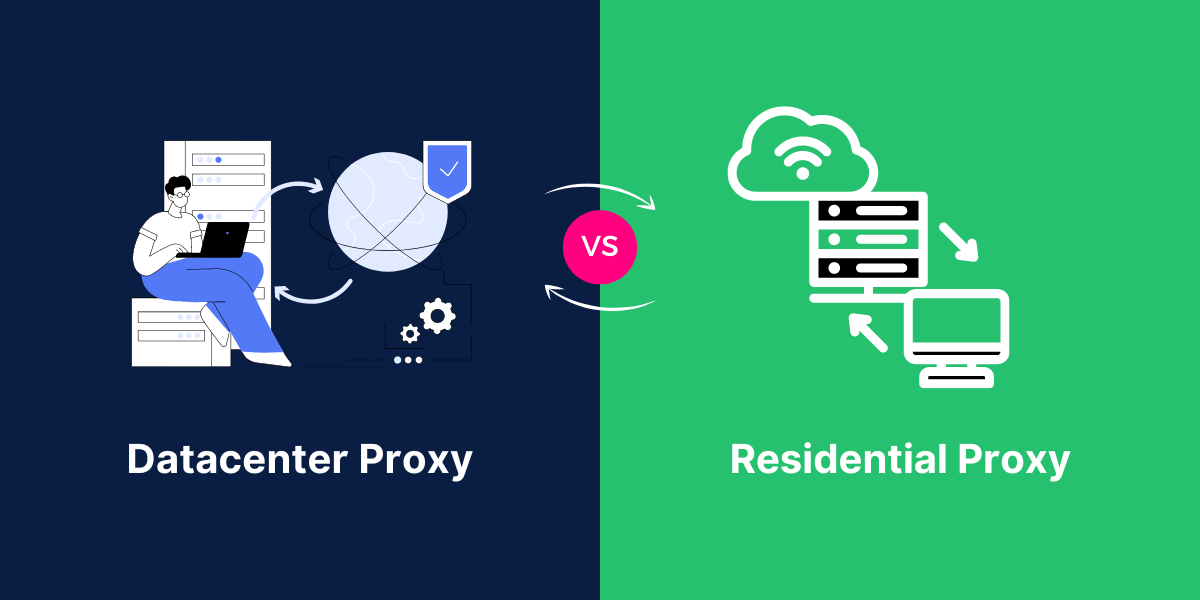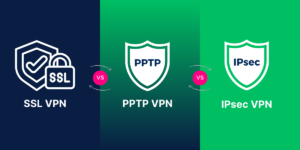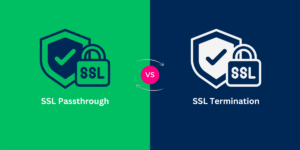Know the Difference Between Datacenter Proxy and Residential Proxy
Proxies are an essential tool for many online activities. They provide anonymity and bypass access restrictions. The two main types of proxies are data center proxies and residential proxies, which serve different purposes.
In the context of “Datacenter Proxy vs Residential Proxy,” data center proxies route traffic through servers in large shared proxy networks. They offer high speed and uptime but need more geographic diversity. On the other hand, residential proxies use real devices on home networks to relay traffic. They mimic organic users and can bypass anti-proxy blocks but have less bandwidth.
The choice between data center and residential proxies depends on your use case. Understanding their key differences allows you to select the right proxy for your needs. BestProxy offers both of these proxy types, along with many other choices, so you can choose the right solution for your needs. With over 80 million IPs and 99.99% uptime, BestProxy becomes a trusted choice for businesses of all sizes.
In this article, we’ll explore the advantages and limitations of each proxy type so you can make an informed decision when procuring proxies for your business or personal use.
Key Takeaways
- Both provide anonymity and disguise IP addresses but work differently. Datacenter proxies route traffic through data center servers, while residential proxies use real home/business internet connections.
- Given their enterprise-grade servers, data center proxies offer fast speeds and reliability. However, their known data center IP addresses are more prone to blocking.
- With their diverse residential IP addresses, residential proxies better emulate human web traffic patterns. However, bandwidth is lower, and acquisition costs are higher.
- Datacenter proxies are ideal for large-volume web scraping or automation tasks where some risk of detection is acceptable. Their high bandwidth suits big data applications.
- Residential proxies are better for activities demanding discreet access, such as social media marketing, sneaker bots, or access to geo-restricted content.
- Consider volume needs, sensitivity to blocking, mimicry requirements, and budget constraints when choosing proxy type.
- Leverage the strengths of each proxy type while mitigating their weaknesses for optimal anonymity results. Mixing proxy sources may provide a good balance.
- Proxy choice is a nuanced decision depending on the specific use case. Both data center and residential proxies have pros and cons to weigh.
- Do thorough due diligence on providers to ensure ethical practices, reliable uptime, and protection of user privacy when acquiring proxies.
Head to Head Comparison Between Datacenter Proxy vs Residential Proxy
|
Feature |
Datacenter Proxies |
Residential Proxies |
|
Speed |
Very fast |
Moderate |
|
Uptime |
Excellent |
Good |
|
Cost |
Low per IP |
High per IP |
|
IP Diversity |
Low |
High |
|
Bandwidth per IP |
High |
Low |
|
Ease of Acquiring IPs |
Easy |
Difficult |
|
Scalability |
High |
Low |
|
Anonymity Level |
Low |
High |
|
Geo-targeting Ability |
Low |
High |
|
Legality of Usage |
Grey Area |
Clearer |
|
Ease of Setup |
Simple |
Complex |
|
Resistance to Blocking |
Low |
High |
What are Datacenter Proxies?
Datacenter proxies are a type of proxy hosted on servers located in large data centers. Data centers are facilities that contain clusters of high-powered computers and networking equipment. They are specifically designed to support the massive bandwidth and processing needs of today’s internet infrastructure.
Companies that specialize in providing data center space and services will often offer data center proxies as well. The proxies are hosted on the servers in their data centers and leverage the fast connection speeds available in that environment. Because data centers are optimized for performance and redundancy, their proxies can handle very large volumes of traffic and requests.
The IP addresses of data center proxies come from large blocks assigned to the data center itself. This makes the traffic appear to originate from the data center rather than from unique residential or commercial IPs. Datacenter proxies are popular for tasks like web scraping, ad verification, and other functions that require reliably sending large volumes of traffic through proxies. However, their more generic IP addresses also make them easier to detect than residential proxies.
The IPs provided by data center proxies are part of large blocks owned by these data center companies, and they are not affiliated with ISP-allocated IPs (unlike residential proxies. Click for more details).
This setup allows for fast, efficient, and stable connections, making data center proxies a popular choice for tasks that require high-speed internet, such as web scraping, bulk data collection, and managing large numbers of simultaneous requests.
Benefits of Datacenter Proxies
- Fast connection speeds and high uptime thanks to robust server infrastructure. This makes them ideal for tasks requiring rapid data processing and retrieval.
- Cost-effective compared to residential proxies since they are easy to operate at scale and leverage large pools of IPs.
Drawbacks of Data Center Proxies
- It is easier for websites to detect and block since the same IPs are reused heavily for scraping, bots, etc. Blanket bans are more likely.
- Large volumes of traffic from data centers raise red flags for vigilant websites trying to protect their data.
What are Residential Proxies?
Residential proxies are another major type of proxy that route traffic through residential IP addresses. Unlike data center proxies, residential proxies use real home or business internet connections as their server endpoints.
The IP addresses of residential proxies come from the pool assigned to a regular ISP, such as Comcast, Verizon, etc. This makes the traffic appear to originate from a personal computer, phone, or other device in a home or office. The IP addresses are also dispersed across different geographical regions.
Because residential proxies emulate authentic user traffic patterns and IPs, they can effectively mask the fact that a proxy is being used. This makes them ideal for activities that require a high level of anonymity and evading detection, such as accessing social media or content restricted by geography. For users looking to buy static residential proxy solutions at an affordable rate, providers like Proxy-cheap offer accessible options that balance anonymity with cost-effective performance.
The tradeoff is that residential proxies have much lower bandwidth capabilities than data center proxies. Each IP is tied to an actual consumer-grade internet plan, which has a much lower throughput than the dedicated connections in data centers. Residential proxies are also more expensive because each IP needs to be acquired individually rather than in bulk.
Benefits of Residential Proxies
Here’re the benefits of Residential Proxies:
- Increased anonymity because the IPs mimic real residential internet users. This allows residential proxies to evade bot detection and IP bans better.
- It is useful for accessing highly monitored websites and platforms since the traffic blends in with normal human activity. It is ideal for web scraping, managing multiple accounts, etc.
Drawbacks of Residential Proxies
- Slower speeds and lower reliability due to routing through consumer ISP connections with variable performance.
- It is more expensive to acquire since each IP needs to be sourced individually from ethical residential sources.
- Availability fluctuates since the behavioral patterns of residential devices/users are unpredictable.
What is the Main Difference between Both Types?
The main difference between data centers and residential proxies is the source of the IP addresses and how that impacts the visibility of proxy use.
Datacenter IP addresses originate from large server farms and networking infrastructure clearly identified as belonging to data centers. This makes the proxy traffic easier to single out and potentially block since data centers are known sources of automated bots and scraping activity.
Residential IP addresses come from actual home or business internet connections from various internet service providers. Because the IP addresses blend in with normal residential traffic, using residential proxies is much harder to detect. The proxy activity appears as any other human user browsing the web.
This stealth of residential proxies makes them ideal for activities where mimicking real human behavior is important. Social media automation, ad verification, brand protection, etc, require proxies that can evade sophisticated bot detection and stay under the radar. Datacenter proxies are more likely to be flagged as suspicious by algorithms and get blocked.
So, in essence, residential proxies better disguise automated traffic as organic human activity by using real residential IP addresses. Datacenter proxies trade away some of that anonymity for more reliability and bandwidth capabilities. The needs of the particular internet activity at hand determine which proxy type offers the right blend of performance and stealth.
Final Thoughts
In the world of proxies, data centers and residential proxies represent the two major options, each with its strengths. Datacenter proxies offer high speeds and uptime for heavy-duty scraping or automation tasks, though they carry a higher risk of detection. Residential proxies provide better mimicry of real user patterns via diverse residential IPs, albeit at lower bandwidths per IP and higher costs.
Ultimately, choosing between data center or residential proxies depends on your specific needs – factors like required volumes, sensitivity to detection, and budget constraints will determine the ideal proxy type. Both remain valuable tools for anonymity if applied judiciously for the use case at hand. Leveraging their respective benefits while mitigating their downsides can enable smooth and productive proxy operations.
Frequently Asked Questions
What is the main difference between a datacenter proxy and a residential proxy?
The main difference is that a datacenter proxy originates from a datacenter IP address, while a residential proxy originates from a real residential IP address.
Are datacenter proxies faster than residential proxies?
Generally yes, datacenter proxies are faster because they have high bandwidth capacity, while residential proxies usually have lower bandwidth.
Are residential proxies more anonymous than datacenter proxies?
Yes, residential proxies are more anonymous because they use real residential IP addresses that can’t be easily blocked, while datacenter IPs are known to be from a proxy provider.
What are the typical use cases for datacenter proxies vs residential proxies?
Datacenter proxies are good for general web scraping and fast access to public APIs. Residential proxies are used for sites that block datacenters, such as social media sites.
Are residential proxies more expensive than datacenter proxies?
Yes, residential proxies are more expensive to rent because real residential IPs must constantly be rotated. Datacenter proxies are cheaper.
Can you get blocked using either type of proxy?
Yes, both types of proxies can be blocked if used heavily on sites that don’t allow scraping. Residential proxies are less often blocked, though.

Priya Mervana
 Verified Web Security Experts
Verified Web Security Experts
Priya Mervana is working at SSLInsights.com as a web security expert with over 10 years of experience writing about encryption, SSL certificates, and online privacy. She aims to make complex security topics easily understandable for everyday internet users.



